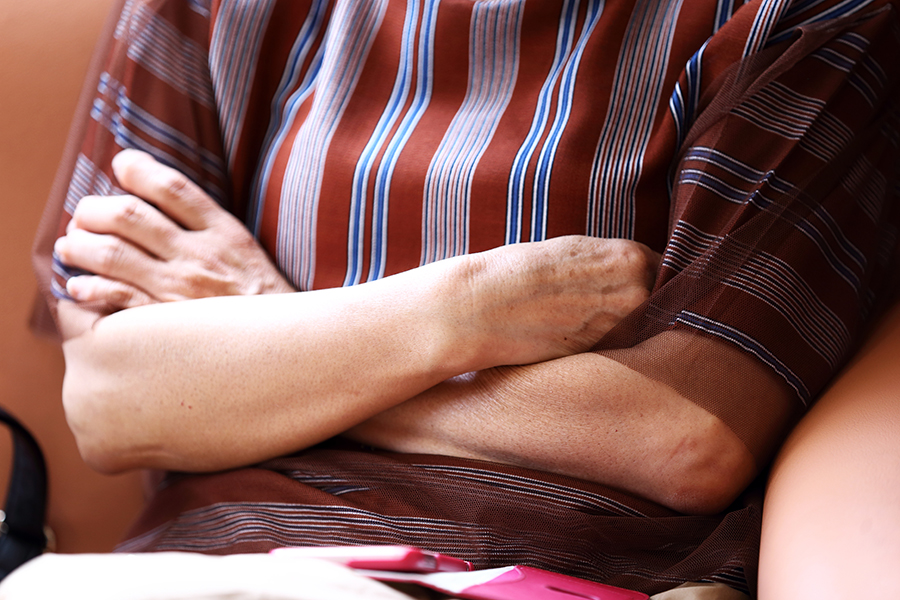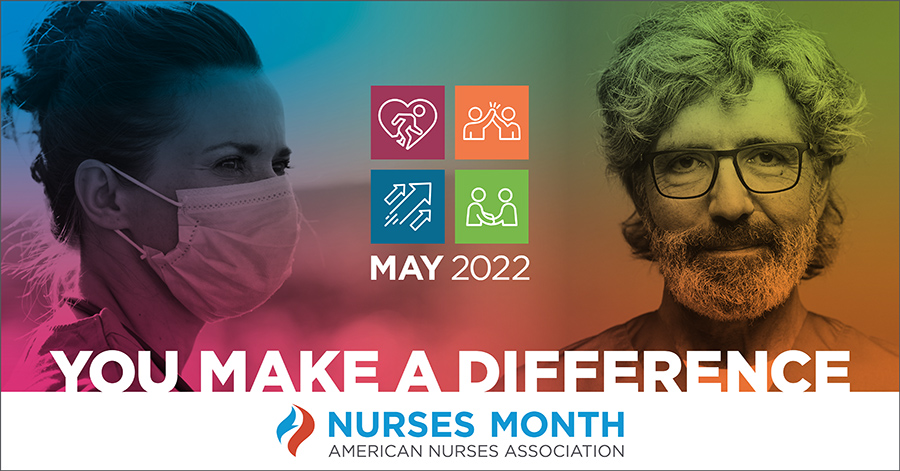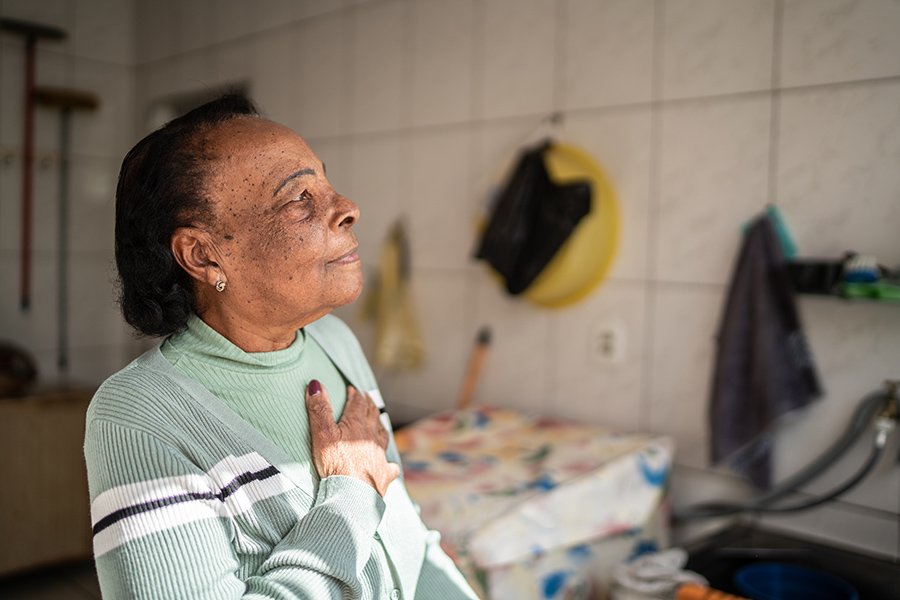As individuals living with Down syndrome live and thrive into old age, some additional health conditions may become more prevalent. Each individual with Down syndrome is different, and not every person will have additional health conditions. Many of these associated conditions can be treated with medication, surgery, or other interventions.
Common Health Conditions for People with Down Syndrome
Common health conditions that people with Down syndrome may experience include:
Heart anomalies
Many babies with Down syndrome are born with a congenital heart defect. The most common congenital heart defect in children with Down syndrome is atrioventricular septal defect, also known as a ‘hole in the heart’. Congenital heart defects can cause high blood pressure in the lungs, the inability to effectively pump blood through the body, and cyanosis (blue-tinted skin due to an insufficient amount of oxygen in the blood.)
At birth, babies are checked for heart problems. They are checked again at 6 weeks old. The seriousness of the heart defect depends on how it affects the way that blood flows through the body. Some cases may be mild, while others are complex or severe. The level and complexity of the defect may determine whether the issue will resolve on its own, whether your child’s doctor recommends surgery, or whether it might impact life expectancy.
The American Academy of Pediatrics (AAP) Committee on Genetics recommends that babies born with Down syndrome receive an echocardiogram and be evaluated by a pediatric cardiologist.
Hypothyroidism
The thyroid produces hormones that the body uses to help regulate temperature and energy. When the thyroid produces little to no thyroid hormone, hypothyroidism occurs. Hypothyroidism is more common in children with Down syndrome but can be treated by taking an oral thyroid hormone throughout life.
Symptoms can include lethargy, lack of concentration, weight gain, rough dry skin, memory impairment, or intolerance of cold.
Thyroid issues can be present at birth or may develop later in life. A thyroid exam is recommended at birth, 6 months of age and annually throughout life.
Alzheimer’s Disease
People with Down syndrome are more likely to develop Alzheimer’s disease. Studies have shown that genes on chromosome 21 produce amyloid precursor protein which is a big factor in the brain changes that are seen in Alzheimer patients. It is estimated that approximately 30% of people with Down syndrome in their 50’s have Alzheimer’s disease. That number jumps to approximately 50% by age 60.
Hypotonia
Hypotonia, or poor muscle tone, is common in children with Down syndrome. This can contribute to delays in reaching milestones such as learning to roll over, sit up, crawl, and walk. Even with these delays, children with Down syndrome learn to participate in physical activities with other children.
Poor muscle tone mixed with the tendency for the tongue to stick out can make it difficult for infants with Down syndrome to feed, regardless of whether they are breastfed or fed with a bottle. Nutritional supplements may be required to ensure that enough proper nutrients are being received.
Weak muscles can also lead to digestive issues, such as difficulty swallowing and constipation. Families can work with a gastroenterologist to overcome these issues.
You can help your baby strengthen their muscles by exercising and stimulating them, tickling them, and helping them into a sitting position. A physiotherapist can also help combat hypotonia.
Vision problems
Over 50% of children with Down syndrome experience vision problems. Common vision issues include cataracts, near-sightedness, “crossed” eyes, and rapid, involuntary eye movements.
The AAP recommends that babies born with Down syndrome be examined by a pediatric eye specialist and continue to have regular vision exams.
Hearing loss
Up to 75% of children with Down syndrome experience some form of hearing loss, which can be related to the structure of the ear. They may have narrower Eustachian tubes than typical children, which can cause them to develop ear infections more frequently. Eustachian tubes drain fluid from the center of the ear. Blocked Eustachian tubes can also lead to a condition known as ‘glue ear’ which usually clears up on its own, but may need surgery if persistent. Ear infections in children with Down syndrome should be treated quickly to prevent hearing loss.
The AAP recommends that babies born with Down syndrome be screened for hearing loss at birth and regularly have follow-up hearing exams.
Infections
Down syndrome can cause immune system issues, making it difficult to fight off infections. This means even minor infections should be treated immediately and closely monitored.
Children with Down syndrome should also receive all of the recommended immunizations to help prevent infections.
Babies with Down syndrome have a 62-fold higher rate of pneumonia than babies without Down syndrome.
Blood disorders
Children with Down syndrome are more likely to develop leukemia, anemia, and polycythemia. Also known as erythrocytosis, polycythemia is characterized by an elevated number of red blood cells. It’s often found in newborns with Down syndrome, and usually resolves within a few months. Iron deficiency anemia (IDA) is the most common cause of anemia among people with Down syndrome. Children with Down syndrome are also approximately 18 times more likely to develop leukemia than typical children.
Problems with the upper part of the spine
Children with Down syndrome can have misshapen bones just under the base of their skull in the upper part of their spine. These bones can press on the spinal cord, increasing the risk of injury.
Those with Down synrome are also at greater risk of atlantoaxial instability. This condition occurs when the ligaments between the first and second cervical vertebrae in the neck are loose. This can lead to spinal cord injuries if the joint dislocates.
Doctors should take note if atlantoaxial instability is present before surgery on a patient with Down syndrome. There are certain movements that are required for anesthesia that could potentially cause injury, and precautions should be taken to avoid these movements.
Upper respiratory tract
Children with Down syndrome can have narrow nasal passages, making them more prone to coughs, colds, and other chronic respiratory conditions.
Narrow nasal passages can also make those with Down syndrome more prone to having obstructive sleep apnea, causing them to pause their breathing patterns while sleeping. Depending on the level of the sleep apnea, the tonsils may need to be removed, or a continuous positive airway pressure device may be needed.
Gum disease and dental problems
Teeth may come in more slowly in children with Down syndrome. They may also come in in a different order, or they may be misaligned or have fewer teeth. Periodontal disease or gum disease may develop for various reasons. Routine dental visits are recommended.
Epilepsy
Epilepsy is more common in children with Down syndrome, with the risk increasing with age. Almost 50% of adults with Down syndrome who are 50 years or older have epilepsy. Epilepsy and seizures can be treated and managed with medication.
Celiac disease
Children with Down syndrome are more likely to have celiac disease. Celiac disease is a chronic digestive and immune disorder that damages the small intestine and prevents the body from absorbing nutrients from food. It can be triggered by eating gluten, a protein found in wheat, barley, rye, and other grains. Health care providers recommend testing children with Down syndrome for celiac disease around age 2, or younger if they are experiencing symptoms.
Mental health and emotional problems
Children with Down syndrome are not more prone to mental health issues or emotional challenges than typical children. However, individuals with DS may have a harder time coping with behavioral and emotional problems such as anxiety, depression, attention-deficit/hyperactivity disorder, repetitive movements, aggression, autism, psychosis, or social withdrawal. A behavioral specialist may be able to help them work through this. Some medications may also help.
Inclusion and Autonomy in Healthcare
Communication has shown to be a barrier to improved health outcomes for those with intellectual disabilities. Health professionals and those supporting people with Down syndrome should help ensure that people with Down syndrome are included as active participants in discussions around their health and are able to give informed consent and supported decision making. People with Down syndrome are capable and should receive person-centered care. They should be seen as a person and not their condition.
Some tips for communicating with People with Down syndrome include speaking directly to them, not their support person. Don’t give instructions all at once; do it step-by-step, and give them time to process information and respond when they are ready.
To hear directly from parents with children who have Down syndrome and other conditions, explore more articles below:
- What’s It’s Like to Father a Child with Down Syndrome
- When Down Syndrome and Autism Collide
- What it’s Like to Have a Child with Down Syndrome and Autism: Video
- Opening the Door for Inclusion on the Playground
- Why Parents Love Sign Language for Kids with Special Needs
- Adopting a Child with Down Syndrome
- What’s True About Every Person with Down Syndrome
- Down Syndrome Awareness Grows Up
Resources Include:
https://www.pennmedicine.org/for-patients-and-visitors/patient-information/conditions-treated-a-to-z/down-syndrome
https://www.betterhealth.vic.gov.au/health/healthyliving/down-syndrome-and-health
https://www.nichd.nih.gov/health/topics/down/conditioninfo/associated
https://www.mayoclinic.org/diseases-conditions/down-syndrome/symptoms-causes/syc-20355977
https://www.nichd.nih.gov/health/topics/down/more_information/faqs#adults
https://my.clevelandclinic.org/health/diseases/17818-down-syndrome
https://www.cdc.gov/birth-defects/about/down-syndrome.html





















